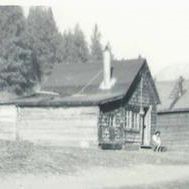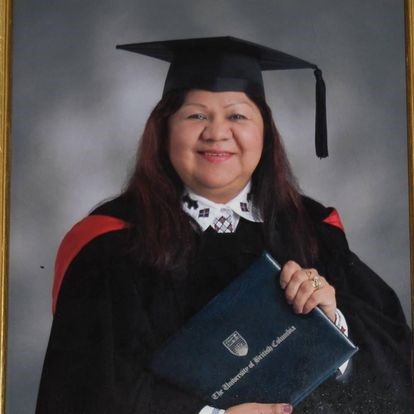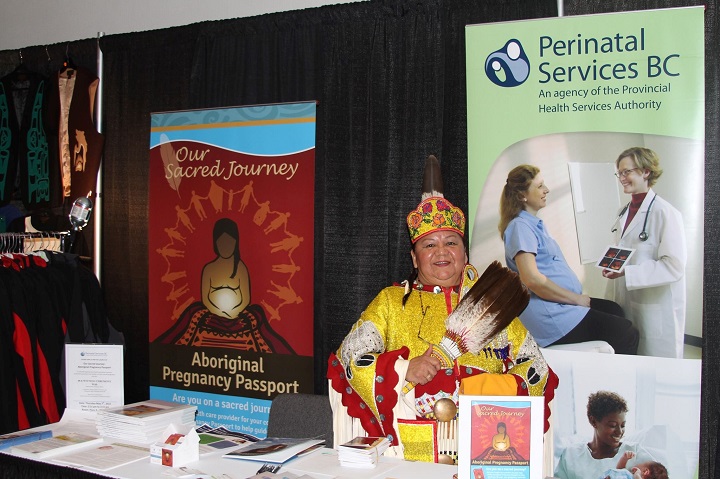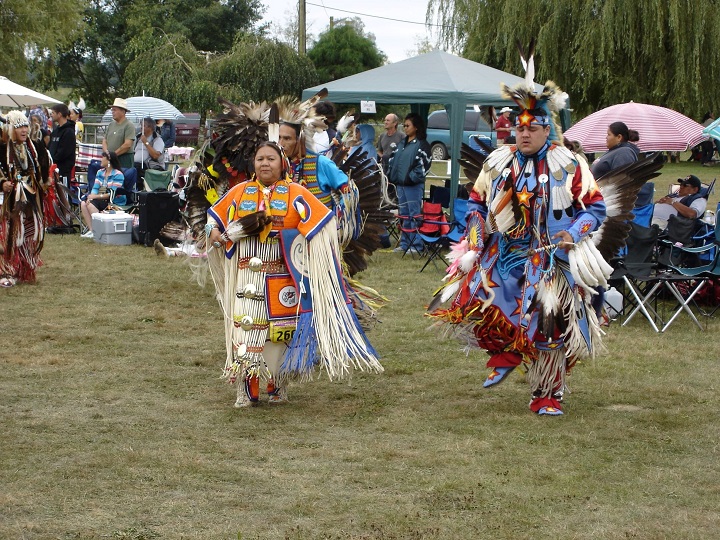Growing up as one of 13 children in her family in Lillooet, Lucy Barney learned a work ethic early in life that would propel her through decades of effort to get where she is now.
 “Every day, before and after school, my parents made us each responsible for regular chores. My jobs were sweeping the floors and tending the orchards," says Lucy, now the provincial lead for Indigenous health with Perinatal Services BC. “We had a good, loving home life, and my parents worked incredibly hard."
“Every day, before and after school, my parents made us each responsible for regular chores. My jobs were sweeping the floors and tending the orchards," says Lucy, now the provincial lead for Indigenous health with Perinatal Services BC. “We had a good, loving home life, and my parents worked incredibly hard."
Both of Lucy's parents and most of her older siblings were forced to go to residential school. But, as one of the youngest siblings, Lucy went to local public school instead.
“Before I learned English, I failed grades one and two, and failed grade three twice!" Lucy remembers. But in grade four, once she'd become fluent in English, Lucy started earning straight-A grades. She went on to be one of the only children in her family to stay in school past grade 10.
“I loved learning, but I never once dreamed of becoming a nurse," said Lucy. “We just didn't have mentors for that sort of thing. I thought nurses, dentists and doctors were gods."
After her high school courses, Lucy moved to Vancouver for secretarial school. In the city, she met her partner of now-39 years, and he suggested she consider the higher-paying hospital unit clerk course instead. Lucy had a fear of hospitals – especially the antiseptic smell – but decided to push herself and take the course anyways.
It was the start of her passion for health care. “I absolutely loved being a unit clerk – at BC Cancer and Richmond Hospital," says Lucy. “It was amazing to see how so many departments and health-care providers can work together, and to see how each different ward works."
While on the maternity ward at Richmond Hospital, one of the nurses noted Lucy's passion and drive, and encouraged her to become a nurse.
“I'd never considered I could do it – I'd never met any Indigenous nurses!" said Lucy. To even apply for nursing school, Lucy needed grade 11 and 12 science credits taken within the last five years – much longer than she'd been out of high school.
So, at 35 with a young son at home, Lucy went back to high school. Her shift hours as a unit clerk at BC Cancer and Richmond Hospital meant she couldn't attend adult classes at night.
Instead, Lucy joined classrooms of 17-year-olds during the regular high school days while juggling her job and childcare with her partner, who also worked shifts.
Lucy completed all her required courses, and applied to every school of nursing in B.C. Just one accepted her: Langara College. She and her spouse would take turns doing their shift work, and eventually Lucy graduated in 1997 with her Registered Nurse certificate. How did she make it though that whirlwind time? “Let's just say it was a lot – and it was a good thing I was young!"
After working briefly with Diabetes Canada in a non-nursing role, Lucy's worked at PHSA since February 1999. Her first role was at the BC Centre for Disease Control (BCCDC) as the program manager of Chee Mamuk, an Indigenous HIV/AIDS Program. There, she developed the education program to weave in cultural aspects of sharing health information through storytelling and art.
 In 2005, Lucy's curiosity and love of learning motivated her to earn a Masters of Science in Nursing, at UBC's School of Nursing. Her research used ethnography and a community-based research philosophy to explore how culturally relevant education for First Nation Youth could help with the prevention of hepatitis C.
In 2005, Lucy's curiosity and love of learning motivated her to earn a Masters of Science in Nursing, at UBC's School of Nursing. Her research used ethnography and a community-based research philosophy to explore how culturally relevant education for First Nation Youth could help with the prevention of hepatitis C.
After 10 years with BCCDC, Lucy was recruited to what's now Perinatal Services BC in 2008, as the provincial Indigenous lead, and has worked there since.
“Lucy is a strong, resilient Indigenous leader who exemplifies kindness and wisdom," said Christina Tonella, provincial director, Prevention and Primary Care with Perinatal Services BC. “Her inclusivity brings together physicians, midwives, administration, and other allied health workers in the projects she leads and participates in. I also admire her ability to patiently teach those around her about Indigenous ways and culture."
“Lucy doesn't view work hierarchically – she sees each person as equals around a circle, bringing unique expertise and experiences. And, she contributes a wonderful perspective of thoughtfulness and creativity to the work" Christina added.
 During Lucy's time with PSBC, one project she's especially proud of is her work to design, implement and evaluate the Tripartite First Nation Doula Initiative. After the initial pilots in Interior Health and Island Health, communities interested in providing doula services are now funded to choose, train, and support the people they decide are the right fit as a doula in their community.
During Lucy's time with PSBC, one project she's especially proud of is her work to design, implement and evaluate the Tripartite First Nation Doula Initiative. After the initial pilots in Interior Health and Island Health, communities interested in providing doula services are now funded to choose, train, and support the people they decide are the right fit as a doula in their community.
More recently, Lucy and a large team of collaborators came together to create a guide for health professionals on providing culturally safe, humble and trauma-informed care to pregnant Indigenous women and families.
Learn more about the new practice resource and download a copy.
If Lucy has one piece of advice for Indigenous health care, it's that good care takes time.
“If I could change one thing about our health system, I'd want more health care providers to slow down, pause and be present more often with patients."
Lucy knows firsthand how health professionals often feel like there's no time, but believes that spending an extra five minutes building relationships now can lead to better health outcomes later.
Taking time is also crucial to understanding the history required to deliver humble, trauma-informed health care, said Lucy.
Reflecting on this summer's discoveries of hundreds of unmarked graves of Indigenous children in Canadian residential schools, Lucy hopes everyone hearing the news can pause and reflect.
“I want people to take the time to understand those children had spirits, that they had people and communities who loved them, and they missed their parents deeply. They didn't understand what was happening and why, and they had no power to change things. Some parents in my community would go camp out next to the schools to be nearer to their children – just imagine how you'd feel if your children were forcefully taken."
That's why it's important for health professionals to understand why institutional settings like hospitals can be triggering for Indigenous peoples, and why Lucy and her team made sure to include historical context and personal stories in their latest practice resource for health professionals.
“I hope people take the time to learn these parts of the true history of Canada, that it wasn't a good history, and that we now have more tools to use and move forward with together."

